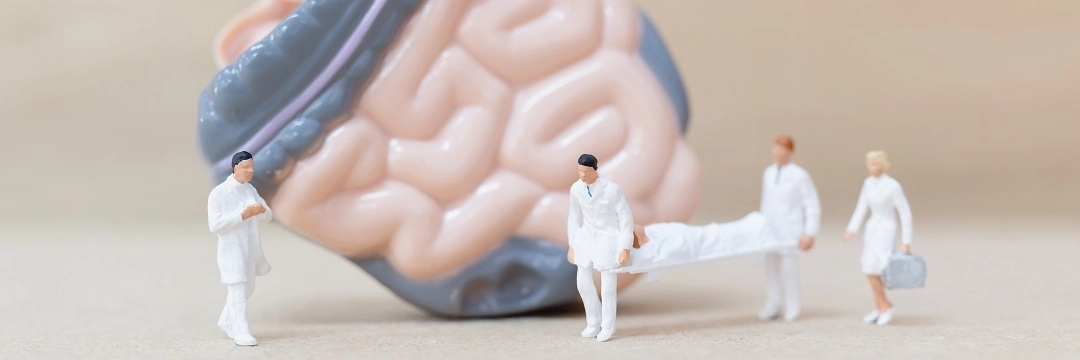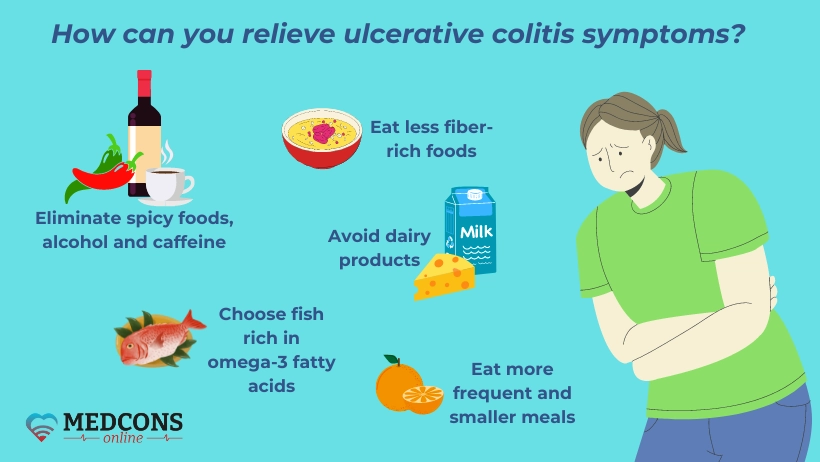
Non-specific ulcerative colitis is an autoimmune disease affecting the large intestine. It is caused by the immune system malfunction due to changes in the intestinal microflora. One of the unfavourable factors may be a prolonged use of antibacterial drugs, especially in children.
Causes of chronic inflammatory bowel disease
The exact mechanism of disease development is unknown. It is believed that a combination of hereditary factors and immune failure plays a role. There is an opinion that viruses or bacteria can provoke the inflammatory process, as well as disruption of the immune system, when its strength is directed against its own cells.
It is possible to distinguish risk factors which raise the odds of the chronic disease:
- frequent infectious diseases suffered in childhood;
- intestinal dysbacteriosis;
- autoimmune pathologies;
- nutritional disorders, especially a pronounced lack of fibre;
- endocrine system disorders;
- frequent stress, diseases of the nervous system;
- hereditary predisposition;
- liver pathologies (with impaired bile production, which makes digestion difficult).
Epidemiology
Autoimmune disease of the large intestine occurs predominantly in patients 20-40 years of age. On average, the initial detection of the disease occurs at the age of 28-30 years. The appearance of the first signs in childhood is found only in 10-15% of cases. Primary detection of the disease after 40 years of age is not characteristic.
In Europe, 7-10 cases are diagnosed annually for every 100,000 people in the population. The pathology is twice as common in people of Caucasian race.
Aetiology
Infection, immune response, genetic predisposition and a combination of environmental factors play a role in the development of the disease. Research on the influence of the intestinal microflora on the likelihood of colitis is still ongoing.
The role of cytokines and immunoregulating cells in the formation of immune response in patients with NUC is of special importance in the study of pathology. There is an opinion that one of the main links in the development of colitis is energy deficiency of the colonic epithelium.
Signs of non-specific ulcerative colitis
The course of this chronic disease, as a rule, has a wave-like character. During an exacerbation, signs characteristic of a particular part of the intestine appear. A frequent symptom is intestinal bleeding, especially when the rectum is affected. Most patients complain of episodic abdominal pain, stool irregularities such as diarrhoea, flatulence, excessive fatigue, high body temperature.
Common symptoms
The manifestations of the disease depend on which part of the intestine is affected:
- in left-sided colitis involving the colon, there is an admixture of blood in the stool, pain in the ileum, lack of appetite and, as a consequence, weight loss;
- total colitis, when the entire large intestine is affected, pain and bleeding become constant, which poses a threat to human life due to a decrease in pressure.
Especially dangerous is the peractive form of the disease. In this case, the probability of complications increases, including the rupture of the intestinal walls or the formation of megacolon (toxic enlargement of the intestinal lumen).
Intestinal symptoms
Almost all patients complain of blood in the stool. In the case when the rectum is affected, drops of blood appear on the surface of the stool. If the color of the stool is changed in general, it is worth looking for signs of inflammatory diseases in the upper intestine.
The next sign is diarrhoea, recurring up to 15-20 times a day during the exacerbation. With a severe course, there are admixtures of pus in the stool.
Pain with nonspecific ulcerative colitis is concentrated in the left side of the abdomen, with total lesions spilt, pronounced. Patients often complain of painful urges to defecate.
Extraintestinal manifestations
In addition to intestinal complaints, patients may be bothered by extraintestinal signs:
- nodular erythema in the form of painful red nodules;
- gangrenous pyoderma;
- aphthous stomatitis;
- gingivitis or inflammation of the gums;
- polyarthritis;
- sacroileitis;
- spondylitis (lesions of the spine);
- iritis (inflammation of the iris).
In addition to the above, extraintestinal signs include increased body temperature, weakness, weight loss, lack of appetite, increased heart rate, and decreased haemoglobin levels.
Pathogenesis of non-specific ulcerative colitis
The development of this disease usually starts from the rectum. In the case when inflammation is limited only to this department, we are talking about ulcerative proctitis. But more often the pathological process slowly spreads to all parts of the intestine.
The disease affects only the mucous membrane of the colon and submucosal layer. The lesion of deeper layers is not common. Ulcers usually have smooth edges and are different in shape and size. The bottom of the ulcer is clean, there may be a whitish plaque in large lesions.
Cases of ulcer perforation are extremely rare. The symptom severity increases when the descending and sigmoid colon is affected. One in four cases involves the terminal ileum.
Classification and stages
The type of disease is determined depending on the localisation of the pathological focus:
- proctitis and proctosigmoiditis;
- left-sided colitis;
- regional colitis;
- total lesion.
According to the nature of the course, an acute form with a vivid inflammation picture and a chronic form with blurred symptoms are distinguished. The disease may have a recurrent character.
The condition may differ in its severity, including:
mild – with diarrhoea against the background of satisfactory general condition;
medium - with diarrhoea occurring up to 5-7 times a day, blood in the stool, a moderate rise in temperature and signs of anaemia;
severe – with stool frequency reaching 8 or more times, tachycardia, fever, pus in the stool.
Possible complications
The disease is long-lasting and affects the digestive system as well as the general condition of the body.
Local complications
Patients with NUC have a particularly high risk of colorectal cancer. The likelihood of this complication doubles every decade. Therefore, all patients with inflammatory bowel disease should undergo a colonoscopy once a year.
In addition, toxic megacolon occurs in 5% of patients. The intestinal loops dilate, faeces accumulate in them, which can lead to rupture of the intestinal walls and peritonitis.
Systemic complications
In addition to intestinal complications, patients may experience effects such as skin, eye, joint, mucosal and blood disorders.
Diagnosis
As part of the examination, laboratory tests of blood and faeces are ordered. The mandatory ones are:
- gastroscopy, colonoscopy with biopsy allow you to visually inspect the mucosa and take materials for histological examination;
- ultrasound scans of body organs;
- X-ray with contrast to determine the contours of the intestine;
- CT or MRI as indicated (as part of differential diagnosis).
Treatment
Treatment of the disease should be complex, prolonged. Outside the exacerbation, it is important to observe preventive measures.
Diet
To compensate for the loss of iron and vitamin B12, it is recommended to include in the diet foods containing them (lean meat, apples, liver, fish). When making up the meal list one needs to take into account the individual reaction to certain products. It is optimal to do a lactose intolerance test. It is advisable to avoid legumes, milk, whole-grain products, strong coffee and tea. In addition, products with probiotics are recommended.

Conservative therapy
Depending on the location of the focus, topical agents in the form of suppositories and enemas may be used. As part of symptomatic treatment, anti-inflammatory drugs, corticosteroids, immunosuppressants, monoclonal bodies, 5-aminosalicylic acid are prescribed.
With a severe course, conservative therapy is carried out in hospital. The choice of drugs depends on the symptoms.
Surgical treatment
About 30 per cent of cases require surgery. For acute, life-threatening attacks with massive bleeding or perforation, emergency procedure may become necessary.
Indications for surgical treatment:
- Immunosuppressive therapy has been exhausted and cannot control chronic inflammation of the colon.
- The need to take high doses of corticosteroids for too long, leading to cancer and, in children, colonic narrowing or growth retardation.
- An acute, severe inflammatory attack accompanied bysevere colonic dilatation (called toxic megacolon) can lead to a life-threatening condition for the patient if surgery is not performed quickly.
- Signs of a precancerous condition or pre-existing colon cancer are detected.
Complete removal of the colon, rectum and anus (total proctocolectomy) can permanently cure inflammation, maintain a normal life expectancy and eliminate the risk of developing colorectal cancer. The intervention is performed laparoscopically, through minimal incisions. However, approximately 25% of patients develop inflammation in the small intestine after surgery, even if the small intestine was not previously affected. After complete removal of the rectum and anus, a permanent ileostomy is required. The surgeon sews the end of the remaining section of small intestine to a hole in the abdominal wall (stoma). Patients have to wear a plastic bag to collect faeces at all times.
However, there are many alternatives available today. The most common is a procedure called proctocolectomy with the formation of a small intestinal ileoanal reservoir anastomosis. In this procedure, the colon and most of the rectum are removed, and a small reservoir (pouch) is created from the small intestine and connected to the remainder of the rectum just in front of the anus. Because the muscles of the anus (anal sphincter) are not removed, patients retain control of their bowel movements. However, because a small amount of rectal tissue may remain, the risk of cancer, although minimal, is not completely eliminated. A common complication is inflammation of the reservoir (reservoiritis), but this can be managed with antibiotics.
Therapy peculiarities
All patients are required to have a colonoscopy once a year during the course of the course and to see a doctor to assess the effect of the drugs. This will allow timely detection of complications, including cancer.
Prognosis and prevention
If the pathology is mild, the prognosis is favourable. Almost 80% of patients regularly take 5-acetylsalicylates throughout life, thus excluding relapses. Indications for surgery are found in every fifth patient. The risk of malignancy is 3-10%.
There is no specific prevention, since the causes of disorder are not clear. General recommendations are rational nutrition, avoidance of bad habits and reducing the frequency of stress.
A second opinion from doctors in Europe
Nonspecific ulcerative colitis is difficult to diagnose and its treatment requires a lifetime of medication. This also presents its own challenges. To be sure that the diagnosis is correct and the treatment is tailored to the individual, a second opinion from doctors in clinics in Europe will help. Remote consultation will be appropriate at any stage:
- Drawing up an examination plan. Will avoid unnecessary spending on inappropriate procedures. The doctor will tell you which examinations you should undergo in order to exclude similar diseases and accurately diagnose them. Especially important is the opinion of a specialist after receiving the results of diagnosis.
- Drawing up a therapeutic plan. A second opinion of the doctor will help to choose effective methods, taking into account the results of the examination. Specialists of European clinics have extensive experience in the treatment of ulcerative colitis which allows them to implement the latest therapeutic techniques to achieve a stable remission.
- Selection of effective relapse prevention. After completion of the course, it is extremely important to achieve a stable condition and prevent relapse. Here the importance is not only medications, but also lifestyle, dietary habits. Online consultation with a qualified doctor will help the patient to learn more about his disease and direct his knowledge to fight the exacerbation.
The disease can last for years. Patients often write off the clinic of the disease to poisoning, dysbacteriosis and do not turn to doctors. At the same time, without adequate therapy, the condition leads to complications, and some of them are life-threatening. Therefore, if you suspect intestinal disease, you need to undergo a complete examination and select an effective treatment for ulcerative colitis.
References
- Nonspecific ulcerative colitis. II. Pathology of transmural colitis and mucosal colitis, W A Hawk
- Crohn's disease and ulcerative colitis, Xavier Dray, 2007
- Non-specific ulcerative colitis and Crohn's disease, G A Grigor'eva, 1991
- Ulcerative colitis and Crohn's regional enterocolitis. Common aspects and differentiation, H Fahrländer, 1975
- Image source: Free Stock photos by Vecteezy


Comments — 0